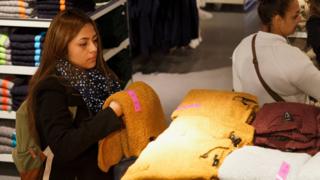Belgium shop fined for discriminating against male job-seeker

Image copyright
Getty Images
Gender stereotyping is said to be common in the retail sector
A Belgian shop has been ordered to pay a man more than €13,000 (£11,726) in damages for turning him down for a job because it wanted a woman.
The man in Louvain (Leuven), near Brussels, complained to Belgium’s institute for gender equality, which won his case at a labour tribunal.
Rejecting his application for stock manager, the clothes shop said it was “looking for a female colleague”.
The institute says it usually resolves discrimination cases out of court.
Neither the shop in Louvain nor the job-seeker were named, for legal reasons.
The award of €13,289.84 represents about six months’ gross salary in the post that the man wanted.
The shop was also ordered to pay one euro to the Institute for Equality between Women and Men (IEFH).
A lawyer at the institute, Pauline Loeckx, told the BBC that in 2017 she and her colleagues handled about 50 claims from men and 60 from women concerning sex discrimination during job recruitment.
At the tribunal, she said, the Louvain clothes shop argued that it had found a more capable woman to do the job. But the evidence of discrimination was in the e-mail it had sent to the male applicant.
Read more on similar topics:
“With men you see the discrimination mostly at the recruitment stage, whereas with women there is discrimination at each stage of work: in recruitment, salary levels and dismissal,” Ms Loeckx said.
Pregnancy-related claims
The IEFH acts to enforce Belgium’s gender equality laws nationally. Last year it handled 295 complaints of sex discrimination – not just workplace discrimination, but also in services.
About 58% of those concerning the workplace came from women, and more than 150 were related to pregnancy, Ms Loeckx said.
The Louvain case, she said, illustrates that recruitment decisions “are often based on stereotypes, not on the real competences of people”.
Image copyright
Getty Images
Construction sites are typically male-dominated areas
Ms Loeckx said men were more likely to suffer discrimination in shops, beauty parlours and kindergartens.
With women, discrimination came more often from transport firms, butchers, builders and taxi businesses.
The IEFH’s annual report (in French) says another issue it handled was “ladies only” events staged by two cinema chains. Men who wanted to go with their female partners to the events were refused entry.
After a complaint from the IEFH the cinemas agreed to admit men, but kept the label “ladies only”, arguing that the promotions were an example of positive discrimination.

